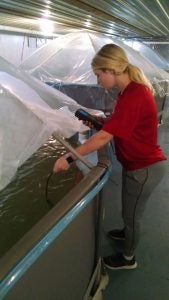When retired pig producer Verne Pretzer and his son Scott were trying to decide what to do with their empty swine barns on the Southeast Nebraska farm, the only natural transition seemed to be … shrimp farming.
The first to bring Pacific White Shrimp to Cornhusker nation, the Pretzer family wanted to diversify their 2,200-acre corn and soybean operation and also keep the next generation enthralled in agriculture.
“My kids are excited and enjoy helping,” said Scott Pretzer. “This makes it all worthwhile.”
Scott’s children, 17-year-old Reid and 14-year-old Skylar, represent the 6th generation of Pretzer farmers, dating back to 1871 when the family immigrated to Nebraska from Germany.
After World War II, Scott’s grandfather returned from the Philippines and started the Diller, Nebraska operation with crops and livestock, including hogs. Later on, Verne joined the business, expanding the farm in the late 1970s to include a hog confinement operation and more crop acreage.
A swine and small animal veterinarian by trade, Scott returned to the family farm full time three years ago when his dad indicated it was time for him to slow down.
“Dad got out of the hog business about 10 years ago (the business was a 240-sow farrow to finish operation) but then leased the buildings until about 4 years ago for finishing,” Scott said. “Dad was ready to get out because our crop operation was growing and he was getting older.”
From swine to shrimp
It was Verne who first turned his son on to shrimp farming after seeing an article on the subject in a farming magazine.
From there Scott started doing a lot of research on his own and networking with other aquaculture farms in the Midwest. The family even visited a shrimp facility a few times before starting their new venture.
It also took Scott and Verne nine months to remodel the empty 160′ by 42′ gestation barn built in 1988. According to Scott, most of the building was ready as it was already well insulated.
With flush gutter pits in the barn, the father and son had to remove all the gates, slats, feed systems, etc. and fill the pits with sand. Then they placed insulation over the sand and a concrete floor was added. After a coat of paint and more insulation added in the attic, the building was ready for the plumbing and tanks.
Rock Creek Aquaculture
Now the barn is home to Rock Creek Aquaculture with eight salt-water tanks and thousands of shrimp. The shrimp are raised without chemicals, hormones, or antibiotics and each tank is a contained ecosystem.
Scott’s day starts very early as morning chores include comprehensive water testing of each tank, feed calculations, water exchange, and tank and shrimp examination. The whole process takes about 2- 2.5 hours.

Since he just started in shrimp farming, Scott sends his results to a consultant each morning before doing anything on his own — to find out how much to feed, what to do with the water, etc. Shrimp are then fed again at noon and at night.
Although Scott is dedicated full time on the farm, he still performs surgeries on an as-needed basis for Ehlers Animal Care in Lincoln. He said the balance is becoming more challenging, but the practice is very understanding.
The future
Since it takes time to get the water conditioned just right, Scott knows first-year sales will be variable. He plans to eventually double the number of pools to 16 and might even add crayfish.
The family plans to construct a retail area in the facility so that people can stop and purchase shrimp during set hours. Once harvests become more predictable, Rock Creek Aquaculture may look at wholesaling to restaurants or stores.
Pretzer’s advice for a farmer looking to diversity with aquaculture — network and don’t do it alone.
“I work with RDM Aquaculture in Indiana for consulting. It is an extra expense but worth every penny,” Pretzer said. “There are too many details and so many things that can go wrong and they are there to help.”
And so far, the ag community have been supportive of the Pretzer family’s novel livestock initiative.
“I think overall it has been positive. Most neighbors are curious and supportive,” Pretzer said. “It is a fascinating field and a great product that is produced responsibly.”



